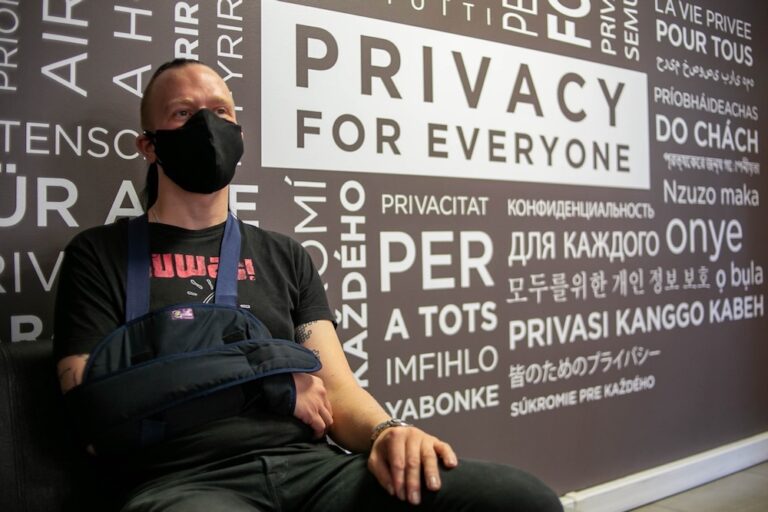(PFC/IFEX) – A number of statements and actions by government officials, including the president, affected the relationship between the government and the press in September 2003. Press unions, academic centres and non-governmental organisations held a number of demonstrations protesting the reluctance of President Lucio Gutiérrez’s government to ratify the 1994 Declaration of Chapultepec. http://portal-pfc.org/libexp/docs/2003/253.html Discussions […]
(PFC/IFEX) – A number of statements and actions by government officials, including the president, affected the relationship between the government and the press in September 2003.
Press unions, academic centres and non-governmental organisations held a number of demonstrations protesting the reluctance of President Lucio Gutiérrez’s government to ratify the 1994 Declaration of Chapultepec. http://portal-pfc.org/libexp/docs/2003/253.html
Discussions regarding the Declaration revived the debate about obligatory licensing and the professional accreditation of journalists. In statements to the press, government spokesperson Marcelo Cevallos said that Principle 8 of the Declaration of Chapultepec was at odds with Ecuador’s laws. Principle 8 stipulates that, “The membership of journalists in guilds, their affiliation to professional and trade associations and the affiliation of the media with business groups must be strictly voluntary”.
Subsequently, Iván Abad, president of the National Journalists’ Federation (Federación Nacional de Periodistas, FENAPE), claimed the Communication Secretariat had decided to allow only journalists who were associated with FENAPE to access and report on government activities. This was refuted by Eduardo Egüez, the secretariat’s executive director.
The 1975 Law on the Journalistic Profession (Ley de Ejercicio Profesional del Periodista) stipulates that in order to be recognised as a “professional journalist” an individual must have a university degree in journalism and be a member of a guild. The law also called for the creation of FENAPE.
Even though the law stipulates these limitations, it has not been extensively applied and therefore has not posed a major threat to freedom of expression. Given the recent declarations by authorities, however, there is concern that the government and FENAPE will begin to require obligatory licensing and university degrees in journalism. Such a move would limit the freedom of those who work as journalists. http://portal-pfc.org/legislacion/2003/033.html
In early September, President Gutiérrez expressed an interest in creating a law that would “guarantee freedom of expression . . . but at the same time ensure that those who spread gossip, lies, or slanderous statements would face legal sanctions.” In the last part of his statement, the president was referring to media outlets, whom he accused of collaborating with the opposition “to turn the public against him.” After complaints by the press, primarily the Ecuadorian Association of Newspaper Publishers (Asociación Ecuatoriana de Editores de Periódicos, AEDEP), the Communications Secretariat said that Gutiérrez “had never said he would create a new law, but rather that he would launch a campaign against insults.” http://portal-pfc.org/legislacion/2003/031.html
As in other countries in Latin America, in Ecuador crimes against the honour of officials and persons in the public eye are punishable by law. In September, the courts suspended an order for the detention of Rodrigo Fierro, a columnist for the daily “El Comercio”. Fierro was facing a six-month sentence for allegedly insulting former president León Febres-Cordero (see IFEX alerts of 26 and 23 September 2003). In a May article, Fierro suggested that the former president’s family was responsible for Ecuadorian bank failures in 1999. http://portal-pfc.org/libexp/docs/2003/262.html
In a separate case, on 11 September, General Octavio Romero, head of the Armed Forces’ Joint Command (Comando Conjunto de las Fuerzas Armadas), convened a number of editors to warn them that his institution would demand that they reveal their sources. “You demand transparency, but we can also demand that you tell us where you obtained the information,” Romero said. http://portal-pfc.org/libexp/docs/2003/244.html
On 20 September, the Human Rights Ecumenical Commission (Comisión Ecuménica de Derechos Humanos, CEDHU) condemned the fact that “El Comercio” had been contacted by a supposed “death squad”, known as “Legión Blanca”. The message contained threats against journalist Kintto Lucas, who is in charge of the alternative newspaper “Tintají” and a correspondent for Inter Press Service (IPS), Pablo Dávalos, a political and economics analyst for several radio stations and newspapers, Marlon Carrión, of the alternative news agency Pachacámac, and others. According to CEDHU, in recent days, threats against journalists and others who denounce wrong-doing have increased. http://portal-pfc.org/libexp/docs/2003/264.html
In a letter to President Gutiérrez, PFC expressed concern over the deterioration in the relationship between the government and the press. The organisation called on the president and government officials to be receptive to criticisms in the media, instead of trying to discredit the work of the journalists.


